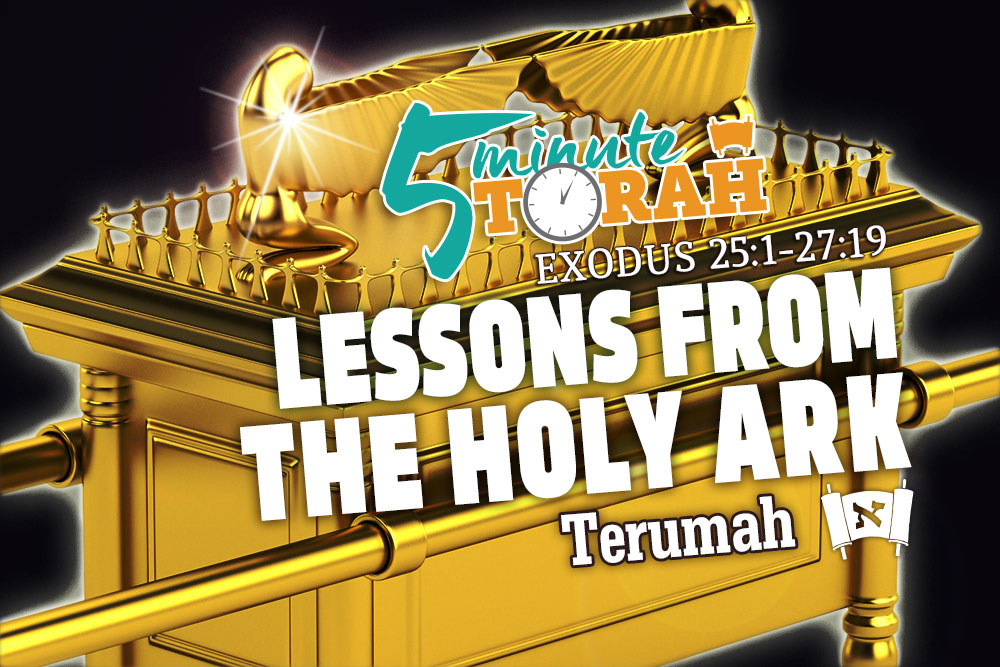Lessons From The Holy Ark
Series:

Parashat Terumah (Exodus 25:1-27:19)
This week’s Torah portion begins with a request from Hashem for materials to use in the construction of the Mishkan, the Holy Tabernacle. It continues with detailed instructions for how the Tabernacle and its furnishings should be made. One of these furnishings was central to the Tabernacle. It was the Aron, the Holy Ark, about which Hashem instructed Moses, “You shall put into the ark the testimony that I shall give you” (Exodus 25:16). He gave Moses specific instructions for making the Ark, saying:
They shall make an ark of acacia wood. Two cubits and a half shall be its length, a cubit and a half its breadth, and a cubit and a half its height. You shall overlay it with pure gold, inside and outside shall you overlay it, and you shall make on it a molding of gold around it. (Exodus 25:10–11)
The Ark was made of three parts. There was an inside box made of pure gold, a middle box made of acacia wood, and an outer box made of pure gold. All three of these came together to make a single unit. It makes sense for the wood to be covered with gold on the outside, but why does it need to be completely encased in gold? Why does the inside of the Ark, something that will almost never been seen by any human being, need to be made of pure gold? On a spiritual level, we can learn a very important lesson from the this.
Our sages tell us that the Ark is a reflection of what a person should be. Just as the ark is the same on the inside as it is on the outside, so must a person also be. Our inward character should not be different than how we present ourselves outwardly. This was the primary criticism Yeshua had against some of the Pharisees of his day:
Woe to you, scribes and Pharisees, hypocrites! For you clean the outside of the cup and the plate, but inside they are full of greed and self-indulgence. You blind Pharisee! First clean the inside of the cup and the plate, that the outside also may be clean. Woe to you, scribes and Pharisees, hypocrites! For you are like whitewashed tombs, which outwardly appear beautiful, but within are full of dead people's bones and all uncleanness. So you also outwardly appear righteous to others, but within you are full of hypocrisy and lawlessness. (Matthew 23:25–28)
Hypocrisy is presenting ourselves one way to others while privately being someone else. Yeshua hated hypocrisy. He told his disciples to deal with the inside and let it work its way out rather than pretending to be righteous outwardly and never dealing with our inner being. This is important because our actions are determined by who we are on the inside.
In the same chastisement against some of the Pharisees, Yeshua also deals with how some of the Pharisees were speaking more highly of themselves than they ought, saying, “You brood of vipers! How can you speak good, when you are evil? For out of the abundance of the heart the mouth speaks” (Matthew 12:34). He also said, “The good person out of the good treasure of his heart produces good, and the evil person out of his evil treasure produces evil, for out of the abundance of the heart his mouth speaks” (Luke 6:45). Our actions can be motivated out of purity or impurity. Speech is one form of action and Yeshua says that our speech ultimately reflects the condition of our heart.
Just as the Ark of the Covenant was covered with the same pure gold both on the outside as it was on the inside, disciples of Yeshua should be a reflection of this reality as well. What people see on the outside should reflect what is on the inside. This means that our public lives should be a reflection of our private lives and not a cover up for them. While we all want others to look on us with some degree of approval and admiration, we should work to develop our character rather than pretend to be someone we are not.
Putting on a false front is like covering the outside of the Ark with iron pyrite, fool’s gold. It may glitter and resemble gold, but sooner or later it will be recognized for what it is and discarded. May we all be a true reflection of our Master Yeshua both inside and out, a pure and precious treasure that houses the Holy Torah within us.








